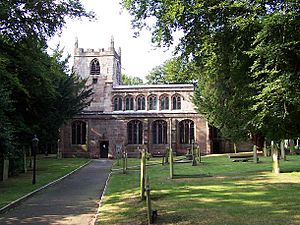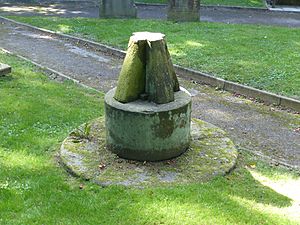St Oswald's Church, Brereton facts for kids
Quick facts for kids St Oswald's Church, Brereton |
|
|---|---|

St Oswald's Church, Brereton, from the south
|
|
| Lua error in Module:Location_map at line 420: attempt to index field 'wikibase' (a nil value). | |
| OS grid reference | SJ 782 648 |
| Location | Brererton Green, Cheshire |
| Country | England |
| Denomination | Anglican |
| Website | St Oswald, Brereton |
| History | |
| Status | Parish church |
| Architecture | |
| Functional status | Active |
| Heritage designation | Grade II* |
| Designated | 14 February 1967 |
| Architectural type | Church |
| Style | Perpendicular |
| Specifications | |
| Materials | Red sandstone |
| Administration | |
| Parish | Brereton |
| Deanery | Congleton |
| Archdeaconry | Macclesfield |
| Diocese | Chester |
| Province | York |
St Oswald's Church is a historic church located north of Brereton Green village in Cheshire, England. It stands right next to Brereton Hall, close to the River Croco. This church is very special because it is listed as a Grade II* building. This means it is an important historical site. Experts describe it as a "complete late Perpendicular church." It is an active Anglican parish church and part of the diocese of Chester.
Contents
A Look at St Oswald's Church History
A small chapel stood on this site during the time of King Richard I. This was many centuries ago. It was originally part of the Astbury parish. The chapel became a full parish church when King Henry VIII was king. The church you see today was built around the year 1550. It was later repaired and updated in 1903.
What Does St Oswald's Church Look Like?
Outside the Church: Exterior Design
The church is built in the Perpendicular style. This style uses straight lines and large windows. It is made from red sandstone. The church has a tower at its west end. It also has a main area called a nave with four sections. There are side areas called aisles on both the north and south sides. A clerestory is a row of windows above the nave.
The tower is surrounded by the ends of the aisles. It has a battlemented parapet at the top. This looks like the top of a castle wall. There are also crocketed pinnacles, which are small, pointed decorations. The roof of the chancel (the area near the altar) is lower than the nave's roof. Both the nave and aisle roofs have parapets. The chancel roof has battlements.
Inside the Church: Interior Features
The roofs inside the nave and chancel are made of wood. They have camber beams and are panelled. The rails around the altar are from the 17th century. They are very decorative. The altar table and a beautifully carved chair are also from the mid-17th century. The font, used for baptisms, is shaped like an octagon and dates to 1660.
The colourful stained glass windows in the east and west are by William Wailes. The east window has five sections. Inside the sanctuary, there is a monument to William Brereton, who passed away in 1618. In the south aisle, you can find a monument to William Smethwick and his wife Frances. He died in 1643, and she passed in 1632.
The church's organ was rebuilt in 1974 by Reeves. The church has a ring of six bells. Three of these bells were made in 1634 by Paul Hutton. Other bells were made later by Abel Rudhall in 1739. Mears and Stainbank of the Whitechapel Bell Foundry made one in 1905. The newest bell was made by John Taylor Bellfounders in 2003. The church's parish registers, which record births, deaths, and marriages, started in 1538.
What Else Can You Find Outside?
In the churchyard, there is a stone sundial. It has a unique design and likely dates from the 18th century. It sits on a round base with a circular stone step. The sundial has a cross-shaped stem and an octagonal top. The dial and pointer (gnomon) are made of copper. This sundial is also a Grade II listed building.
Near the churchyard gate, there is an 18th-century mounting block. This was used to help people get onto horses. The churchyard also holds the war grave of a First World War Canadian soldier.
Notable Burials at St Oswald's
- William Brereton, 1st Baron Brereton
- William Brereton, 2nd Baron Brereton
- John Brereton, 4th Baron Brereton
See also
- Grade II* listed buildings in Cheshire East
- Listed buildings in Brereton, Cheshire


